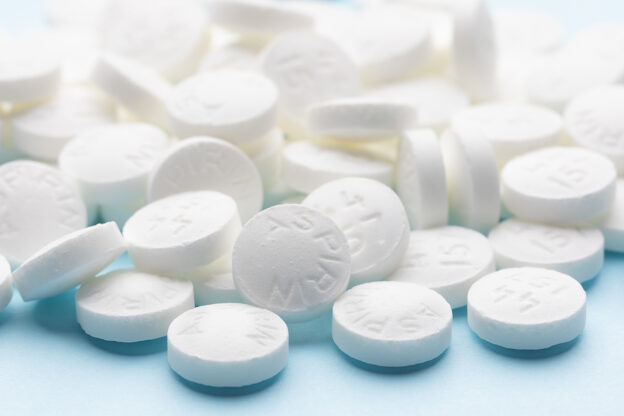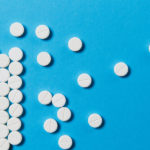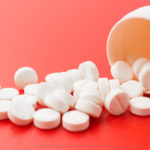By David Blyweiss, M.D., Advanced Natural Wellness
November 10, 2021
Remember baby aspirin? We used to give it to kids when they had a fever. Then we found out it could cause a very serious illness, called Reye’s syndrome, in children with viral infections. So since the 1980’s parents have been advised not to give children aspirin unless recommended by a physician.
But that didn’t harm the sale of baby aspirin at all!
Today we call it “low dose aspirin.” And about 30 million U.S. adults 40 years of age and older take it daily. They are all hoping it will help them prevent heart disease; ward off a heart attack or stroke.
Most of these people don’t even have cardiovascular disease to start with. In fact, nearly half of older adults taking it don’t have any history of cardiovascular issues. And a large number of them are taking low dose aspirin without a doctor’s recommendation.
For decades I’ve warned my patients and readers against the use of low-dose aspirin for the primary prevention of cardiovascular disease.
Just because it’s sold over the counter, it doesn’t mean aspirin doesn’t carry some very dangerous side effect.
Aspirin Bleeds Outweigh Benefits
Open your arteries, improve blood flow for a new health miracle...
Did you know your circulatory system has over 60,000 miles of arteries, veins and other blood vessels, if stretched end to end?
But as you age, your blood vessels undergo changes, which may cause them to stiffen, thicken and get clogged.
GOOD NEWS! Doctors have now identified a “Miracle Molecule” inside your arteries that helps OPEN your arteries and IMPROVE blood flow.
It’s what Dr. Valentin Fuster calls it, "One of the most important discoveries in the history of cardiovascular medicine."To you, that means...
- Healthy blood pressure
- Sharper mind and memory
- Skyrocketing energy and muscular strength
- Increased pleasure and passion in the bedroom
- Improved circulation to every cell and organ in your body
Go here to discover a new natural way to significantly boost the levels of this miracle molecule in YOUR body NOW!
If aspirin was newly discovered today and tried to come on the market, it would not meet G.R.A.S. (generally regarded as safe) requirements and would therefore not be allowed to be sold. Gastrointestinal bleeds are at the top of the list when it comes to the dangers of daily aspirin use. And I’m not talking about a tiny little ulcer. In many cases, these bleeds are so awful that patients require blood transfusions.
Even worse, daily aspirin use can put you at greater risk of intracranial hemorrhage. This is something that happens when a blood vessel in your brain ruptures. As the blood leaks into the surrounding tissue, it starts killing off all-important brain cells. And believe me. It’s not something you want to experience.
Plus, a large number of people are placed on dual therapies. This is when a patient is advised to use aspirin as an adjunct to their regular blood thinner.
And what a disaster that is! It immediately places all of these patients at risk of serious bleeds – or worse, hemorrhagic stroke.
As far as I’m concerned, there is absolutely no reason anyone should take aspirin on a daily basis, low-dose or not. You’ll never catch me doing it!
I’ve simply never agreed with the idea of prescribing low-dose aspirin in an attempt to ward off heart disease.
Thankfully, the U.S. Preventive Services Task Force (USPSTF) finally agrees with me.
They now recommend against low dose aspirin for the primary prevention of cardiovascular disease in people 60 years or older. The bleeding risks simply outweigh any potential benefits.
Are You Suffering From...
- Love handles and a pot belly
- Romance that isn't what it used to
- Forgetfulness and inattention
- Low (or no) strength and endurance
- A sex drive that's shifted into neutral...or worse
If so...you may have Mature Male Burnout. Click here to discover more about this unique condition and what you can do about it.
For people between 40 and 50, they advise that taking low dose aspirin should be an individual choice. And only for those who have a 10% or greater 10-year risk of heart disease. But the USPSTF also notes that among people in this group who choose to take aspirin, the net benefit is small.
Natural Blood Thinners
If you or your doctor has a concern about blood-clotting issues, there are several healthier and more effective ways to help keep your blood nice and thin so it flows easily through your arteries.
For example, garlic contains compounds that help keep your blood cells from sticking together. This means improved blood flow and less chance of clotting.
It also helps to prevent oxidation of LDL cholesterol, lowers blood pressure and protects against free radical damage. So it’s definitely a heart-healthy food. If eating it is an issue for you or others around you, I recommend taking aged garlic extract.
Ginger is another winner. It contains compounds that have even more anti-platelet activity than aspirin does. It’s anti-inflammatory and works extremely well as a blood thinner in patients with heart disease and diabetes.
You can buy the whole root or look for it in jars. It comes pickled, unpickled sliced and minced. Or, you can try a ginger supplement.
Gingko Biloba is another favorite of mine. It interferes with a chemical in your body that causes blood platelets to cling to the walls of your blood vessels. Look for a gingko biloba tea, or supplement with 120 to 240 mg daily.
I also recommend eating foods high in nitrates helps your body produce a gas called nitric oxide. This compound “invigorates” your blood vessels. This not only helps keep your blood platelets from clumping together. It also supports healthy blood pressure and protects the delicate inner lining endothelium of your blood vessels.
Some of these foods include beetroot, kale, melon, celery and lettuce. However, the quickest and most effective way to produce more of this compound is with a nitric oxide enhancer.
Look for a plant-based formula that has beetroot juice as its main ingredient. These formulas vary from one manufacturer to another, so make sure to choose the one that gives you the biggest bang [XX you may or may not want to click thru to Nitrinol ad or product page] for your buck.
Important! If you’re already taking a blood thinner, these foods can interact with it to make your blood too thin. So it’s extremely important not to eat them if you’re on Coumadin, Heparin, Xarelto, Eliquis… or whatever new blood thinner appears on the market.
SOURCES:
Surgeon General’s Advisory on the Use of Salicylates and Reye Syndrome. CDC/MMWR. Jun 1982:31(22);289-90.
O’Brien CW, Juraschek SP, Wee CC. Prevalence of Aspirin Use for Primary Prevention of Cardiovascular Disease in the United States: Results From the 2017 National Health Interview Survey. Ann Intern Med. 2019;171(8):596-598.
García Rodríguez LA, Martín-Pérez M, Hennekens CH, Rothwell PM, Lanas A. Bleeding Risk with Long-Term Low-Dose Aspirin: A Systematic Review of Observational Studies. PLoS One. 2016 Aug 4;11(8):e0160046.
Schaefer JK, Li Y, Gu X, Souphis NM, Haymart B, Kline-Rogers E, Almany SL, Kaatz S, Kozlowski JH, Krol GD, Sood SL, Froehlich JB, Barnes GD. Association of Adding Aspirin to Warfarin Therapy Without an Apparent Indication With Bleeding and Other Adverse Events. JAMA Intern Med. 2019 Apr 1;179(4):533-541.
Makheja AN, Bailey JM. Antiplatelet constituents of garlic and onion. Agents Actions. 1990 Mar;29(3-4):360-3.
Bordia A, Verma SK, Srivastava KC. Effect of ginger (Zingiber officinale Rosc.) and fenugreek (Trigonella foenumgraecum L.) on blood lipids, blood sugar and platelet aggregation in patients with coronary artery disease. Prostaglandins Leukot Essent Fatty Acids. 1997 May;56(5):379-84.
Nurtjahja-Tjendraputra E, Ammit AJ, Roufogalis BD, Tran VH, Duke CC. Effective anti-platelet and COX-1 enzyme inhibitors from pungent constituents of ginger. Thromb Res. 2003;111(4-5):259-65.
Peng SY, Zhang FY, Ou-Yang XY, Liu Y, Wang WJ. Effect of ginkgolide B on the platelet-activating factor induced changes of chemotaxis and cytoskeleton of macrophages. Yao Xue Xue Bao. 2006;41:156-160
Webb AJ, Patel N, Loukogeorgakis S, Okorie M, Aboud Z, Misra S, Rashid R, Miall P, Deanfield J, Benjamin N, MacAllister R, Hobbs AJ, Ahluwalia A. Acute blood pressure lowering, vasoprotective, and antiplatelet properties of dietary nitrate via bioconversion to nitrite. Hypertension. 2008 Mar;51(3):784-90.







